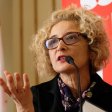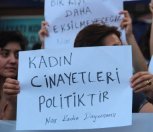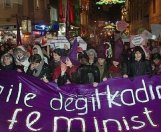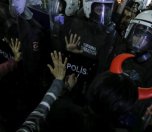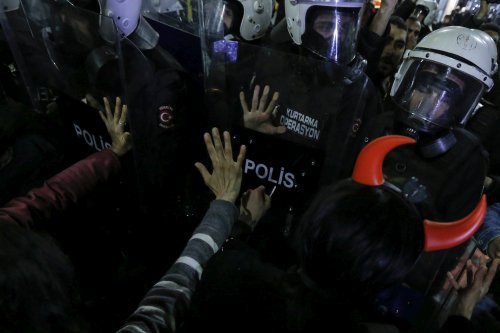*Photo: Hikmet Adal / bianet
Feminism has so far benefited no one, neither will it in the future (Kadından Sorumlu Olmayan Kadın Bakan 2011)
It is significant that this quotation is from Fatma Şahin, the Minister of Family and Social Policies (Aile ve Sosyal Politikalar Bakanlığı, ASPB), known for her relative openness to dialogue with women's rights and feminist organizations. Reading it through a feminist lense locates it into the broader antifeminist consistency that runs through the AKP's rule. It also underlines the alternative rescheduling of the AKP's rule in the past 16 years.
The malestream scheduling takes either the general elections and/or the turning points in the parliamentary – presidential power balances as its basis. In either case, it parallels the AKP's preference of framing its term(s) in power through the leader's rhetoric ("Cumhurbaşkanı Erdoğan: Şimdi Büyük Ustalık Dönemine Hazırlanalım" 2018):
"[Our investments in the past 16 years were] works of our apprenticeship. Then followed the foremanship, and then mastership. Today, ... we are coming to the end of foremanship. [5]
"Now we shall get ready for the grand mastership ... Are you ready to award us with the diploma for grand mastership?" [6]
Here the alternative scheduling that I use relies on the major shifts and relocations in the venues of rights-based political participation. Thus, it takes AKP's neoliberal negotiating terms in government (2002-2010) as its first period, shifts to a shorter term between 2011 – 2013 as the second period, and designates the term after 2013 as the last stage of the AKP's terms in office – this last stage symbolizes the first phase of the new regime in Turkey. In the first eight years of its rule, the party pursued an array of strategic alliances and tactful dialogues. The alliance that the party forged with both secular business circles, and its pro negotiation attitude toward the women's rights/feminist organizations were instrumental in dislocating the established power of the Kemalist (republican) regime that marked Turkey's almost 100 years long political history. It is in this phase that major steps were taken in legal reforms in dialogue with women's rights/feminist organizations, as in the amendments to the Turkish Penal Code (2004), Amendment to Law on Municipalities (2005), the establishment of the Parliamentary Commission for the Equality of Women and Men (2009). One instance of such tendency to dialogue was the 2010 referendum process. Since the same period also hosted the Democratic Opening attempt, which was also named as the "Kurdish Opening" or "The Project of National Unity and Fraternity." The process proved to have a short life (2010-2014) (""Açılımı" Kadınlara Anlattı" 2010).
The invitees to the dialogue are symbolic of, what I noted as, strategic alliances and tactful dialogue – among the participants were forerunning women's rights/feminist organizations such as Association for Supporting and Educating Women Candidates (Kadın Adayları Destekleme ve Eğitme Derneği), [7] Flying Broom (Uçan Süpürge), Association of Women Entrepreneurs (Kadın Girişimciler Derneği), Women's Platform for the Constitution (Anayasa Kadın Platformu), Başkent Women's Platform (Başkent Kadın Platformu), Women's Rights Association for Anti-Discrimination (Ayrımcılığa Karşı Kadın Hakları Derneği) prominent capital circles, such as Turkish Industrialists and Businessmen Association (Türkiye Sanayici ve İşadamları Derneği), [8] Ankara Entrepreneur Businesswomen and Support Association (Ankara Girişimci İş Kadınları ve Destekleme Derneği), Turkish Religious Foundation Women's Activities Center (Türkiye Diyanet Vakfı Kadın Faaliyetleri Merkezi), and Ladies' Association for Lore and Culture (Hanımlar İlim ve Kültür Derneği), Turkish Foundation of Family Health and Planning (Türkiye Aile Sağlığı ve Planlaması Vakfı). The ambiguity in the messages can be observed in the mixing of the call for peaceful settlement in the "Kurdish issue," and a propaganda for the upcoming September 12, 2010 referendum (Ibid.) – a follow-up to the 2007 referendum that ruled the election of the president by popular vote – hosted in the gendered rhetoric of the AKP.
As the 2010 referendum marks the end of the first phase the change in the name of the State Ministry Responsible for Women and Family (Aile ve Kadından Sorumlu Devlet Bakanlığı, AKSB) to the ASPB signals the start of the second stage of the AKP's rule (2011 – 2013). This phase that corresponds to the fourth AKP government (61st government) can be characterized with the ultimate distinction of women's rights from feminist stance, and the colonization of women's rights demands and feminist claims by an increasingly conservative moral politics.
The transformation of the Ministry from the AKSB to ASPB was managed under Şahin's, an exemplary figure evincing both the achievement of women's movement and the colonization of women's rights demands and feminist claims. Şahin is known with her relative openness to dialogue with feminist organizations, as well as LGBTI organizations. Considering that the previous Minister responsible for the AKSB defined same sex partnership as sickness that needs medical treatment ("Kavaf'a Tepki Yağdı 2010), appointing Şahin as the minister to see the transformation to a more conservatizing structure was an important move on the part of the AKP. This would help to preempt substantial opposition coming from civil societal sphere, which had the potential for international implications.
The appointment of Şahin also spoke to one of the long-voiced demands of the women's movement in Turkey: having more women with experience in women's branches and in working with women's rights organizations, in the parliament and in the government. Şahin came from within AKP's Women's Branches. She had elective affinity with the women's right organizations, especially with those, active in matters of women's political participation. Turkey became the first signatory to ratify the Council of Europe Convention on Preventing Violence Against Women and Domestic Violence (İstanbul Convention) during her term (2011). [9]
Yet these assets, promising a more lucrative institutional setup for gender equality fell short of leading the way to a working cooperation between the governments and organizations for rights-based politics. On the contrary, this period hosted solid policy outcomes by the Ministry toward familialization of gendered questions, and the mainstreaming of the rhetoric of gender justice as the counter-reading of gender relations – against demands for equality. For example, the drafting of the amendments to the Law on the Protection of Family (No. 4320) was pursued under the ministry of Şahin, and in collaboration with invited women's rights/feminist organizations. However, these organizations were not let to have a solid place in the process. After initial consultation, they were pushed out of amendment process.
The end product exemplifies the fluctuations in the AKP governments' approach to democratic rights-based claims: tendency to engage related civil societal organizations in the initial stages of the policy making process as proof of democratic stance, and their abrupt exclusion at the following stages as a matter of conservative authoritarian style of policy-making. In this case, demands coming from women's rights/feminist organizations to ensure government's responsibility in forming and operating Centers to Prevent and Monitor Violence (Şiddet Önleme ve İzleme Merkezleri) and eliminating the (bureaucratic) hurdles for women to seek protection from domestic violence were met (Hacısoftaoğlu 2012).
Women's/feminist organizations' participation in due procedure –in both legal amendments and the monitoring process – were left totally to the arbitrary maneuvers of the government; and those organizations with experience in and through the field were tactfully set aside ("Şahin Kadın Örgütlerini Yanlış Anladı" 2012). The contestation over the name of the law illustrates the colonization of women's rights demands. The draft law was meant to function as an amendment to the Law on Protecting Family (No. 4320). The women's rights organizations had fought for a different name that spoke to women's empowerment rather than that of the (heterosexual) family, but failed. In this latest amendment, they opted for keeping the number of the law the same and changing its name so as to reflect women's individual rights to seek protection from (domestic) violence. Their demand to that effect were manipulated by the government to change the initial Draft Law on the Protection of Women and the Individual Members of the Family from Violence into the Draft Law on the Protection of Family and Prevention of Violence against Women to be enacted as such (Law No. 6284).
The third and the last phase of the AKP's rule starts with the 2013 Gezi Resistance that started as a peaceful social opposition against the reconstruction in the Taksim Square of İstanbul, and turned into a country-wide social resistance against the AKP government's increasingly authoritarian responses. Post-2013 phase hosted the increasing hostility of the AKP governments towards rights-based socio-political opposition. As a follow-up to the colonization of women's rights demands in the previous phase, this stage can be defined by the pervasion of anti-feminist discourse into the sphere of women's rights.
The gradual exclusion of women's movement from the related policy spheres that had already begun in the previous stages, the monopolization of the ASPB's policy sphere with familial politics and the cooperation forged between the Ministry and the Presidency of Religious Affairs (Diyanet İşleri Başkanlığı, DİB) were the adjacent developments. 2013 also hosted the formation of Women and Democracy Center (Kadın ve Demokrasi Merkezi, KADEM) as the AKP's GONGO for women's rights.
In this setting, women as a social and political category lost its individual space on the policy agendas to appear from within the increasing tide of familialistic policy packages. An earlier such package was "Being Family Project" (2013/2014), preceded by the Conference on Being Family, organized by the ASPB in 2012. The Project would be supported by a program to facilitate "the marriage of young people who cannot marry due to economic hardships", and offering young couples marriage counselling – both are presented as assets of social state ("18-24 Yaş Arası Çiftlere 10 Bin TL Evlilik Kredisi" 2013). (This program would be paralleled by almost the same rhetoric and arrangements by Davutoğlu government in 2015 in the Program to Protect Family and Population.)
The same can be observed in the cooperation between the ASPB and the Ministry of Justice by making it compulsory to take family counseling before going to court. As noted above the third partner to this cooperation is the DİB through Family and Religious Counseling Desks as well as Family Spiritual Guidance and Counseling Desks.
2013 also hosted repetitive emphasis in official discourse on family not only as an important social unit and/or as the main solidarity network but also as a matter of national security.
Starting with the opening speech of the "International Summit of Family and Social Policies" in January, and continuing with the introduction of the Being Family Project in July, Erdoğan – then Prime Minister - expressed the consistent theme(s) that ran through the AKP's rule:
"... Strong families, with at least three children. ... One child means bankruptcy, two children mean bankruptcy, three children mean running around in circles. We need young and dynamic population. ... I am addressing ... mothers, do not underestimate this sensitivity of us; we need to expand this in waves." ("Erdoğan: 'Bir Çocuk İflas, İki Çocuk İflas, Üç Çocuk Ancak Yerinde Saymak!'" 2013)
"... They operated birth control mechanisms in this country for years. ... caesarean is as such, abortion is as such. ... They wanted this nation to decrease in population and to lay back in the race of nations. ... I especially call to our women. You are the first to give this game away." ("Doğum Kontrolü Oyununu Bozuyoruz" 2013)
The gender regime that surfaces through the first two stages of the AKP's terms was defined as neoliberal-conservative patriarchy – as a transitory mode (Coşar and Yeğenoğlu, 2011).
The third stage hosts the institutionalization of a new regime in Turkey, and hence, it invites considerations of the possible modes of patriarchy that fit into the new conditions. (SC/VK)
CLICK - Part 1: Regime Change in Turkey: Old Symbols into New Settings
CLICK - Part 3: Regime Change and the New Mode of Patriarchy in Turkey
CLICK - Part 4: Naming the Feminist Stance
About Simten CoşarProf. Dr. Simten Coşar graduated from the Department of Political Science and International Relations of Boğaziçi University in İstanbul. She completed her Master's and PhD studies at the Department of Political Science and Public Administration of Bilkent University in Ankara. Her major subjects of academic interest are political thought, political thought in Turkey, political parties in Turkey and women in political thought. Her articles have been published on a series academic journals including the Journal of Political Ideologies, Contemporary Politics, Feminist Review, Journal of Third World Studies, South European Society and Politics ve Monthly Review. She has retired from the Department of Radio, Television and Cinema of Hacettepe University Faculty of Communication. |
Footnotes:
[6] In a speech for the 2011 general elections, Erdoğan had merged the mastership with grand mastership: ''Today, I believe that foremanship is coming to an end. By your entrusting, if you award us with mastership certificate, tomorrow we will step into our mastership. ... We will march to 2023 through the mastership." "Başbakan Tuzla'dan Halka Seslendi." 2011. https://www.ahaber.com.tr/gundem/2011/06/11/basbakantuzladan-halka-seslendi
[7] The name of the Association was changed in 2012 to the Association for Supporting Women Candidates.
[8] The name of the Association was changed on January 18, 2018 to Turkish Industrialists and Businesspersons Association (on the official website of the Association the following English name is listed: Turkish Industry and Business Association).
[9] The Convention was put into force in 2014.
References:
"18-24 Yaş Arası Çiftlere 10 Bin TL Evlilik Kredisi." 2013. http://www.milliyet.com.tr/18-24-yas-arasi-ciftlere-10-bintl/ekonomi/detay/1785905/default.htm November 2.
""Açılımı" Kadınlara Anlattı." 2010. https://www.takvim.com.tr/guncel/2010/07/18/acilimi_kadinlara_anlatti July 18.
"Erdoğan: 'Bir Çocuk İflas, İki Çocuk İflas, Üç Çocuk Ancak Yerinde Saymak!'" 2013. https://www.star.com.tr/politika/erdogan-bir-cocuk-iflas-ikicocuk-iflas-uc-cocuk-ancak-yerinde-saymak-haber-716656/
Coşar, Simten and Metin Yeğenoğlu. 2011. "New Grounds for Patriarchy in Turkey? Gender Policy in the Age of the AKP." South European Society and Politics, 16 no.4: 555-573.
"Cumhurbaşkanı Erdoğan: Şimdi Büyük Ustalık Dönemine Hazırlanalım." 2018. http://www.milliyet.com.tr/cumhurbaskani-erdogan-simdi-buyuk-ustalikistanbul-yerelhaber-2831098/ May 29.
"Doğum Kontrolü Oyununu Bozuyoruz." 2013. https://www.trthaber.com/haber/gundem/dogum-kontrolu-oyununu-artikbozuyoruz-89956.html June 18.
Hacısoftaoğlu, Çiğdem. 2012. ""Şiddet" Yasa Taslağı Ne Getiriyor?" Interview by Çiçek Tahaoğlu. bianet, February 01. https://m.bianet.org/bianet/insan-haklari/135869-siddet-yasa-taslagi-ne-getiriyor (Accessed on August 10, 2018.)
"Kadından Sorumlu Olmayan Kadın Bakan: Fatma Şahin." 2011. bianet July 07. https://m.bianet.org/bianet/diger/131302-kadindan-sorumlu-olmayankadin-bakan-fatma-sahin (Accessed on September 4, 2018.)
"Kavaf'a Tepki Yağdı: Utanç Verici, İstifa Etmeli." 2010. http://www.kaosgl.org/sayfa.php?id=4417 March 8. (Accessed on December 20, 2018.)
"Şahin Kadın Örgütlerini Yanlış Anladı." 2012. bianet, March 06. https://m.bianet.org/bianet/insan-haklari/136702-sahin-kadin-orgutlerini-yanlisanladi (Accessed on August 10, 2018.)




